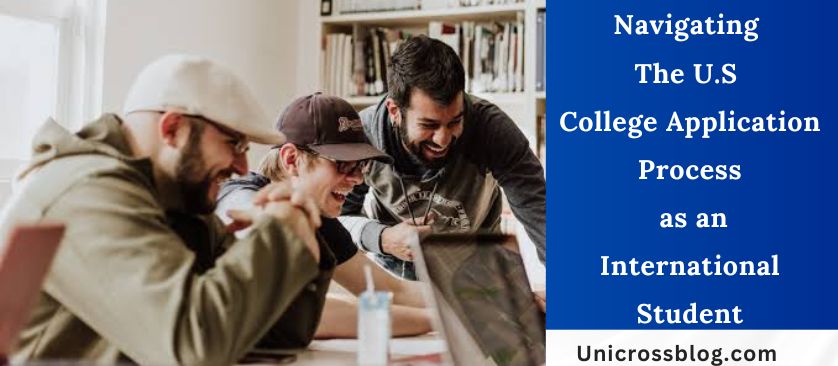As you begin the journey of applying to college in the United States as an international student, you will encounter both familiar and unfamiliar aspects of the application process. While some components like taking standardized tests and writing application essays may feel familiar, other requirements like obtaining an F-1 student visa and demonstrating English proficiency may feel daunting and confusing. With careful planning, ample preparation, and timely execution, you can successfully navigate the U.S. college application process.
This article provides an overview of the key steps, essential documents, and helpful resources to guide you through this process efficiently as an international applicant. Approaching each component methodically and allowing plenty of time will enable you to submit polished, complete applications and transition smoothly to your academic life in America.

Understanding the U.S. College Application Process
1. Researching Schools
As an international student, researching potential schools is key. Focus on location, programs of study, admission requirements, and available scholarships. For location, consider opportunities for internships, weather preferences, and cost of living. Review program requirements and courses to find the best academic fit. Make sure you understand standardized test scores, language proficiency, and transcript submission needed for admission. Explore scholarships and financial aid options at each school.
2. Preparing Your Application
Most schools require similar materials: an application form, official high school/secondary school transcripts, standardized test scores, an essay or personal statement, letters of recommendation, and an application fee. Prepare thoroughly and give yourself plenty of time.
3. Standardized Testing
Two common tests for U.S. college admission are the SAT and ACT. Register and prepare for the one required by your target schools. These scores, combined with your grades, help schools evaluate your college readiness.
4. Essays and Personal Statements
The essay allows you to share your unique story and passion with the admission committee. Follow the prompt carefully and be authentic in conveying your personality, values, and goals. Have others review and provide feedback on your essay before submitting.
5. Submitting Your Application
Meet all deadlines to be considered for admission and scholarships. Submit official transcripts, test scores, essays, recommendations, and any other required materials before deadlines. Keep records of all items submitted. Most schools offer online application portals to submit and track the progress of your application.
With diligent preparation and timeliness in submitting a compelling application, you have an excellent opportunity to gain admission to U.S. colleges and embark on this exciting new chapter of your education. Best of luck!
Key Differences for International Students
As an international student applying to U.S. colleges, there are some key differences to keep in mind compared to domestic applicants.
1. Earlier Application Deadlines
Application deadlines for international students are often earlier than for domestic students. This is because the admission process for international students takes longer as it involves extra steps like obtaining an F-1 student visa. To ensure you have enough time, check the deadlines for international applicants and submit your materials at least 1-2 months in advance.
2. English Proficiency Requirements
Colleges require international applicants to demonstrate strong English skills. This is usually done through standardized tests like the TOEFL or IELTS. Minimum score requirements vary by school, so make sure you meet the thresholds for your target colleges. It may help to start preparing early and aim for scores above the minimum to strengthen your application.
3. Financial Documentation
International students must provide financial documentation proving they can afford to study in the U.S. This typically includes bank statements, income statements, and funding commitment letters. The amounts required also vary by school but usually range from $30,000 to $60,000 per year to cover tuition and living expenses. Gather the necessary financial evidence well in advance of application deadlines.
4. Optional Components
Some parts of the college application are optional for domestic students but recommended or required for internationals. For example, submitting SAT/ACT scores, teacher recommendations, and an admissions interview. These components allow you to demonstrate your abilities beyond just grades and English test scores. Take advantage of any optional materials to build a compelling case for your admission.
With the right preparation, navigating the U.S. college application process as an international student can be achieved. By understanding the key differences, you can ensure you give yourself plenty of time to obtain the necessary materials and put your best application forward. With hard work and perseverance, you’ll be joining the class of your dreams in no time!
Building a Strong College Application as an International Student
As an international student aspiring to study in the U.S., you will need to prepare a compelling college application to stand out among other applicants. Your application is your chance to highlight your unique experiences, perspectives and qualifications.
1. Academic Transcripts and Test Scores
Your academic performance and English language proficiency scores are important components of your application. Request official transcripts from all secondary schools you have attended. For English tests, aim for high scores in the TOEFL or IELTS to demonstrate strong English skills.
2. Personal Statement
The personal statement allows you to share your story and convey your personality. Discuss your background, interests, accomplishments, future goals, and reasons for applying to a particular college. Explain how your experiences will contribute to campus life. Your essay should be authentic, not boastful, with a positive and enthusiastic tone. Have others review and provide feedback on your drafts.
3. Letters of Recommendation
Ask teachers who know you well to write letters of recommendation discussing your strengths, work, and character. Meet with them to share details about the colleges you are applying to and your future goals to help them craft a personalized letter. Provide them with a resume outlining your activities and accomplishments. Follow up to ensure the letters are submitted on time.
4. Extracurricular Activities
Colleges seek students who will actively contribute to campus life. Highlight your extracurricular activities, community service, internships, summer programs, and hobbies. Discuss skills and lessons gained from these experiences. International students may face additional challenges accessing extracurricular activities, so emphasize any you have participated in.
5. Financial Documents
As an international student, you will need to provide financial documents proving you can afford non-resident tuition and living expenses. Work with your parents or sponsors to prepare official bank statements, scholarships, and sponsor letters as needed. Meeting the financial requirements is key to obtaining a student visa.
By dedicating time to each part of the application, securing strong recommendations, and demonstrating your unique qualifications, you can build a compelling case for admission as an international student. With thorough preparation and an optimistic attitude, you will navigate the U.S. college application process successfully.
READ ALSO: 10 Top Tips to Winning a Scholarship in UK 2024
FAQs
When should I start the application process?
It is recommended that you start researching schools and the application process at least 12 months before your intended start date. The application process can take a significant amount of time, especially if applying for financial aid or student visas. Beginning early will ensure you have enough time to explore your options and submit all required paperwork.
What tests do I need to take?
Most schools require international students to submit scores from the Test of English as a Foreign Language (TOEFL) or International English Language Testing System (IELTS) to demonstrate English proficiency. You will also likely need to take the SAT or ACT for admission to undergraduate programs. Check with your target schools for their specific testing requirements.
How do I apply for financial aid?
As an international student, you are not eligible for federal student aid from the U.S. government. However, many schools offer scholarships, grants, and funding programs specifically for international students. You will need to indicate on your college applications that you wish to be considered for aid and submit any additional financial aid forms required by the schools. Private student loans and scholarships from organizations in your home country may also be options.
What kind of application do I need to submit?
Nearly all schools accept the Common Application for international undergraduate admission. You will need to submit official high school/secondary school transcripts, a personal essay, letters of recommendation, and your test scores. Schools may require additional information like a school profile or mid-term report. Check with each school for their complete list of application requirements.
The college application process for international students can be challenging to navigate, but with time and patience, you can find success. Do your research, start early, and don’t hesitate to reach out to schools with any questions you may have.








